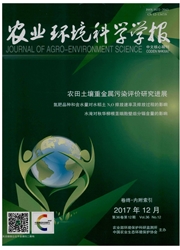

 中文摘要:
中文摘要:
在2009和2010年利用独特的稻/麦轮作系统FACE(Free Air CO2 Enrichment,开放式空气CO2浓度增高)平台,以武运粳21、扬辐粳8号、武香粳14和武粳15为供试材料,研究了高浓度CO(2比大气背景CO2浓度高200 μmol·mol-1)对粳稻蒸煮米的硬度、粘性、香气、光泽、完整性、味道和口感等的影响。物性分析仪测定结果表明,高浓度CO2环境下粳稻熟米的硬度和粘性总体呈增加趋势,其中扬辐粳8号两指标的增幅均达显著水平。食味计测定结果显示,高浓度CO2对蒸煮稻米香气、光泽度、完整性、味道和口感等食味品质指标均没有影响。相关分析表明,CO2与品种的互作对米饭硬度和粘性有显著影响,但对食味品质参数均没有影响。CO2与年度、CO2与年度和品种间的互作对所有测定参数均无显著影响。两年数据一致表明,未来高浓度CO2环境下粳稻蒸煮米的硬度和粘性将呈增加趋势,增幅因品种而异,但米饭食味品质无显著变化。
 英文摘要:
英文摘要:
Rising atmospheric carbon dioxide (CO2) concentration promotes plant growth and enhances crop yield, however, it's impacts on crop quality is unclear. To investigate the effects of elevated COz concentration on the cooking and eating quality of japonica rice, free-air CO2 enrichment(FACE ) experiments were conducted at Jiangdu, Jiangsu, China in 2009 and 2010. Four varieties of japonica rice were ex- posed to ambient and elevated(ca. 200 Ixmol· tool-I above ambient) concentrations of CO2. At maturity, rice grains were dehulled and then milled, and milled rice were cooked. The cooked rice were assessed for hardness, stickiness, aroma, luster, intactness, flavor, taste and the overall palatability. Elevated CO2 eoncentratio/a tended to increase the hardness and stickiness of cooked flee, but the response was different between varieties. Among all tested varieties, only Yangfujing 8 showed significantly increase in hardness and stickiness under elevated CO2 concentration. Elevated CO2 concentration did not change eating quality of cooked rice, such as aroma, luster, intactness, flavor, taste, as well as overall palatability on an index by integrating the individual traits. Significant CO2 by variety interactions occurred in hardness and sticki- ness, but not in other taste traits. These results indicated that rice grains grown in high CO2 environments tend to be more hardy and sticky after cooking, and the texture changes were variety-dependent. The rice palatability may not change in the future high CO2 environment.
 同期刊论文项目
同期刊论文项目
 同项目期刊论文
同项目期刊论文
 Effects of elevated ozone, carbon dioxide, and the combination of both on the grain quality of Chine
Effects of elevated ozone, carbon dioxide, and the combination of both on the grain quality of Chine The impact of elevated CO2 and temperature on grain quality of rice grown under open-air field condi
The impact of elevated CO2 and temperature on grain quality of rice grown under open-air field condi 期刊信息
期刊信息
